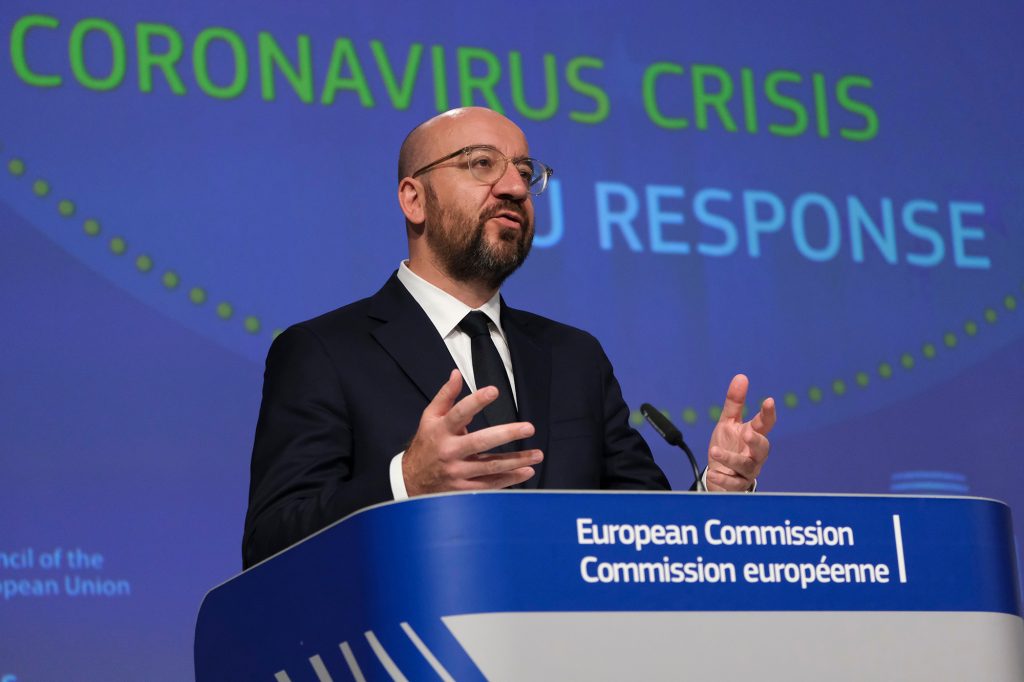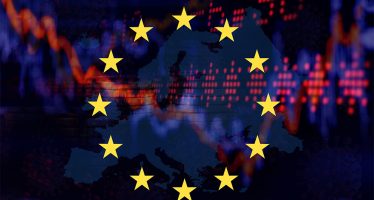Waterloo or Austerlitz: EU Nears Moment of Truth
The European Union approaches a now-or-never moment when leaders of the 27-strong bloc meet in a video conference to discuss ways out of the pandemic quagmire that bogs down the continent’s economy and threatens to escalate the present recession into a full-blown depression.

President of the European Council: Charles Michel
All participants of today’s virtual summit have promised to be on their best behaviour and recognise the severity of the crisis – and the need for decisive concerted action. The EU’s more traditional kick-the-can-down-the-road attitude, that usually includes ineffective half-baked compromises, can no longer delay the arrival of doomsday. The latest batch of horrifying economic data seems to indicate that the day of judgment has already dawned.
EU President Charles Michel, who chairs the meeting of the European Council, pleaded with participants to leave their ‘hand grenades’ at home. He wants to avoid a major clash between northern and southern member states such as the one that took place when the bloc’s finance ministers met online two weeks ago. A former prime minister of Belgium who managed to stay in power for five years, Mr Michel is exceptionally skilled in bridging divides and defusing tensions. He will need to draw heavily on his vast experience in bringing together warring factions in order to pave the road to post-corona recovery.
Though the EU may not yet face a choice between Waterloo and Austerlitz – there is always a tomorrow in the union – the bloc must agree on a common set of policy instruments lest sceptical markets throw down the gauntlet and decide to test Brussels’ resolve. The European Central Bank (ECB) is already now feeling the heat of market forces that doubt the institution’s ability to provide the required amounts of cash to struggling Eurozone member states such as Italy and Spain.
A month after her bold ‘no limits’ statement, ECB President Christine Lagarde is back at square one and apparently powerless to avoid a sharp increase in European bond spreads that take the 10-year German federal ‘bund’ as the benchmark against which other euro sovereigns are measured. Earlier this week, the yield on Italian bonds crossed a Rubicon of sorts when it broke the 2 percent barrier, pushing the spread to 2.6 percent, thus revisiting the heights of the mid-March selloff that sparked Ms Lagarde’s comment.
Quoted in the Financial Times, John Taylor of investment manager AllianceBernstein warned that markets could ‘very quickly’ lose confidence should spreads continue to rise. For now, Mr Taylor is holding on to his Italian government bonds as are most of his peers. They expect the central bank to intervene and boost the rate of its asset purchases in order to push down spreads.
However, perception – arguably the largest mover of markets – is failing Ms Lagarde. The ECB president is almost continuously being compared, both unfavourably and unfairly, to her predecessor Mario Draghi, aka Super Mario, whose stern and often even overbearing demeanour left no doubt about who was in charge and calling the shots. Whilst Mr Draghi managed to cower markets into submission, Ms Lagarde has not yet succeeded in doing so.
It has now transpired that the ECB Governing Council was wrecked by dissent in the days leading up to Ms Lagarde’s ‘no limits’ statement. Since then, subgroups have coalesced within the council that undermine the institution’s ability to intervene with the forcefulness required by the moment. Though Dutch-led Hanseatic 2.0 subgroup of monetary hawks has awarded Ms Lagarde considerable leeway, the collective also drew a few lines that are not to be crossed. One of those lines involves a taboo on the expansion of the M1 ‘narrow’ money supply – i.e. the minting of fresh euros.
The attempt by Ms Lagarde to rule by consensus seems to have backfired. In a rare moment of candour, Dutch Central Bank President Klaas Knot deplored Ms Lagarde’s decision to replace the oval meeting table used by the council whilst Mr Draghi chaired its meetings, with a round one that is meant to emphasise the equal status of ECB members and executives. Some traders interpreted this office furniture swap as a sign of weakness and an invitation to dissent.
Perhaps not quite cornered yet, but certainly embattled, the ECB president must also navigate the present crisis without explicit political support. In 2012, as the banking crisis neared its climax, German Chancellor Angela Merkel and French President Francois Hollande immediately backed up the ‘whatever-it-takes’ statement that epitomised the Draghi era. In contrast, Ms Lagarde is largely being left to her own devices. She also faces a more hostile global setting with a US president who, unlike his predecessor, seems to consider the entire European project a hostile attempt to deprive his country of the ‘greatness’ it aspires to.
Reduced to a backstop for its members’ individual efforts at limiting the economic fallout of the pandemic, Ms Lagarde’s ECB now has to avert a possible debt crisis of an almost unprecedented size. Already creaking and buckling under the comparatively light stresses induced by the 2012 Greek financial crisis, the euro may well give out completely should key Eurozone economies such as Italy and Spain get into serious trouble. Still, few analysts expect the currency to fail. As Ms Lagarde emphasised in het March pronouncements, the Corona Recession requires first and foremost a fiscal response. This is precisely what Eurozone member states have been working on, albeit in an uncoordinated and mostly haphazard fashion.
Today’s meeting of the European Council, the body that sets the overall policy of the union, is to sketch the outlines of a large-scale economic recovery programme. Going into the meeting, the Frugal Four (Austria, Denmark, Sweden, and The Netherlands) warned that they will not want to discuss any form of debt pooling. The quartet argues that expressions of intra-union solidarity do not equate to mindlessly throwing money at the problem and calls for more sophisticated solutions.
Dutch Prime Minister Mark Rutte promised to show his softer side in today’s meeting and earlier this week apologised profusely for the behaviour of Finance Minister Wopke Hoekstra whose monumental bluntness in rejecting Italian and Spanish pleads for debt mutualisation caused even the Germans a bout of vicarious embarrassment. Mr Rutte ensured that his country stands ready to offer help and suggested the European Commission first map the actual needs of individual member states before committing funds over and above those already earmarked for emergency support.
The Frugal Four and their hangers-on are not expected to object to the €540 billion support package agreed to by EU finance ministers on 9 April which includes an extra €200 billion for the European Investment Bank (EIB), €240 billion in budget support from the European Stability Mechanism (ESM), and €100 billion to help meet the added cost of unemployment benefits throughout the union. The council will also discuss improved coordination between member states in the loosening of corona restrictions.
The most explosive topic that the 27 leaders of government will broach involves the setting up of a post-pandemic reconstruction fund. Though there is broad agreement over the need for such a fund, member states differ sharply on its size and shape. Spanish Prime Minister Pedro Sánchez proposes the creation of a €1.5 trillion pool of cash that is to disburse grants – not credits – to troubled countries. He suggests an issue of one-time perpetual bonds as a relatively painless way to obtain the necessary cash. Italian Prime Minister Guiseppe Conte wants to present a similar plan at today’s meeting.
To better appreciate the challenge faced by EU President Charles Michel, contrast the Spanish and Italian proposals to the one presented by the Frugal Four: a €25 billion fund to help with added public healthcare expenses.
The council will not just stage a north-south confrontation but must also consider the feelings of East European member states that object to raising free cash for Spain and Italy. The Frugal Four may yet find unexpected allies in Bulgaria and Romania, countries that are troubled by the demands for big money of significantly richer member states. Mr Michel is about to enter a political minefield that stretches to the horizon. He may expect a few detonations along the way.
You may have an interest in also reading…
No Quick Recovery for Europe
Just before the weekend, Germany nosedived into a recession after the Statistisches Bundesamt, the country’s statistics bureau, announced a 2.2
The Gig is Up … or Is It?
The gig economy is anything but stable — but it can be the last line of defence in a crisis,
Sweden – A Controversial Approach Belatedly Vindicated
The Swedes are a trusting lot. Asked if they usually confide in ‘other people’, almost two-thirds of Swedes answered ‘yes’.


















































































